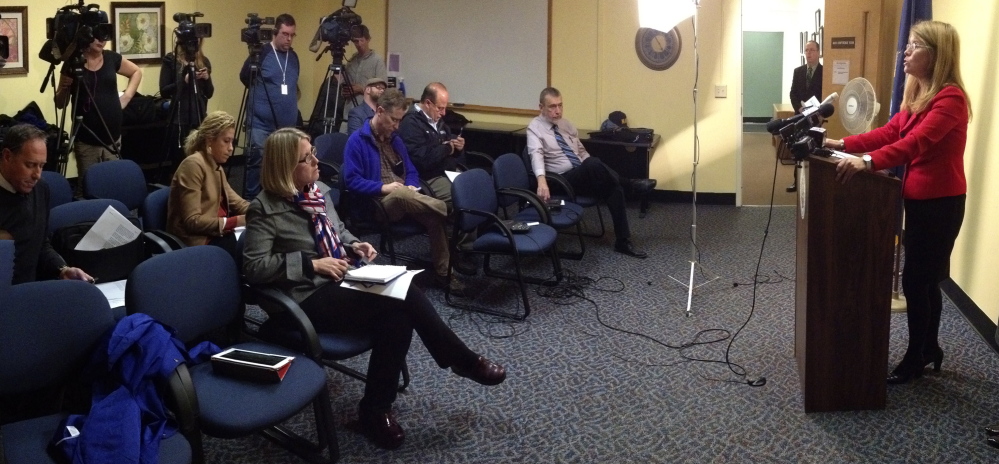In 1991, a 6-year-old girl in Portland told her classmates that she had AIDS. Autum Aquino’s revelation caused fear among parents and school staff, who didn’t know much more about the disease, other than that it was spreading quickly and was almost always fatal.
They had a lot of concerns: Could you catch it if she coughed or sneezed? Could you get it from a drinking fountain? Could it spread through the air?
School officials called a public meeting, and about 100 people came and learned about the little girl’s disease. They learned that she could not spread it through casual contact and that she was not a threat to her classmates’ safety. They learned that because of Autum’s weak immune system, she was actually at greater risk of catching something life-threatening from them than they were of catching something life-threatening from her.
Autum was able to continue school, first at Reiche and then in the Bangor area, graduating from Hampden Academy, where she was a cheerleader, in 2003. She made it her life mission to talk about AIDS until her death in 2008 at the age of 23.
It was hard not to think about Autum and the AIDS crisis during last week’s flurry of activity, when public health nurse Kaci Hickox returned to Maine after caring for seriously ill Ebola patients in Sierra Leone.
MISGUIDED STATE OFFICIALS OVERRULED
People around the state raised legitimate questions: Could Hickox spread the disease by going out in public? Could her boyfriend become a carrier? Were the people who came into contact with her or with him at risk?
Just when those questions needed to be answered, perhaps in some kind of public forum like the community meeting at Reiche School, some of the highest officials in Maine chose to inflame fear by suggesting that Hickox was a threat to her community, and by unsuccessfully seeking a court order to hold her in what amounts to house arrest.
Fortunately, District Court Judge Charles LaVerdiere ruled that Gov. LePage and state Health and Human Services Commissioner Mary Mayhew were acting on “misconceptions, misinformation, bad science and bad information.”
He found that Hickox had “generously, kindly and with compassion lent her skills to aid, comfort, and care for individuals stricken with a terrible disease. We need to remember as we go through this matter that we owe her . . . a debt of gratitude.”
He counseled her to be sensitive to people who are acting out fear, even if the fear is not rational, and follow the U.S. Centers for Disease Control guidelines for people who have been exposed to Ebola – rules that she had already been observing.
How different might things have been if LaVerdiere’s words had come from Gov. LePage, instead of the uninformed and inflammatory statements he made? What if the governor had listened to the 16 public-health and epidemiology experts from Maine who signed an op-ed column published Friday in the Portland Press Herald saying that forced quarantine of health care workers would ultimately make us less safe?
What if he had made one of those experts the spokesperson for the state’s response instead of Mayhew – a political appointee whose only experience in health care was working as a lobbyist for hospitals?
They could have made the following points to address the fears and direct attention to the real threats, not the imagined ones:
• You can’t catch Ebola from someone who doesn’t have it. Hickox was exposed to people with the virus, but she has been tested and found healthy.
• You can’t get Ebola from someone who is not symptomatic. Hickox has had no fever, vomiting, diarrhea or any of the other signs that she is sick. These symptoms are hard to miss, and as a nurse, she is capable of monitoring herself and getting treatment if necessary.
• You can’t catch Ebola through the air, like a cold. The reason it is an epidemic in some countries is that they have a shortage of medical personnel as well as inadequate sewer and water systems, exposing the population to the bodily fluids of people who are infected.
TIME TO FOCUS ON REAL THREATS
But instead of providing clarity, the state tried to use police and the courts to quarantine a woman who is not sick and to protect the community from a disease that she does not have.
The shaky foundation for the state’s position was illustrated Thursday, when Mayhew’s department announced that a restaurant employee in Cumberland County had hepatitis A and may have exposed customers. The state would not release the name of the worker or the restaurant, leaving tens of thousands of Mainers wondering if they might be in danger.
That is a real threat that deserves the attention of state regulators, not the invented threat spread by Maine officials last week.
When Autum Aquino and others spoke out about AIDS, people learned where the real threats were and how to limit the spread of the disease. Then we we were better able to direct resources and care for those who were sick.
Politicians peddling “fear itself” don’t protect us in public health emergencies. We need accurate information and appropriate safeguards, and that is not what the state provided last week.
Send questions/comments to the editors.



Success. Please wait for the page to reload. If the page does not reload within 5 seconds, please refresh the page.
Enter your email and password to access comments.
Hi, to comment on stories you must . This profile is in addition to your subscription and website login.
Already have a commenting profile? .
Invalid username/password.
Please check your email to confirm and complete your registration.
Only subscribers are eligible to post comments. Please subscribe or login first for digital access. Here’s why.
Use the form below to reset your password. When you've submitted your account email, we will send an email with a reset code.